Ian Campbell, Kevin Cookman, and Aya Lehman stayed until the bitter end of Sundance 2020, with a special assist from Jehmbo

ACASA, MY HOME
Dir. Radu Ciorniciuc
Radu Ciorniciuc’s ACASA, MY HOME is a deeply frustrating documentary, though largely by design. It follows the diaspora of Bucharest’s backwood dwellers, families who live adjacent to the modernity of Romania’s capital, but live in swampy shacks off the grid. That is, until social services deem their land valuable and uproots them into a new-age world only several miles away but completely foreign in customs and habitation. A noble stab at cinema vérité, but several sequences, namely a climactic argument between father and eldest son, feel staged to the point of full-throated compromise of journalistic integrity. There’s something fishy here, whether it be these moments or just my general indifference to uninvolved documentary portraits where the inaction of the filmmaker and audience are complicit in others’ suffering. I now know about the horrors of Romania’s destabilized identity politics, but what now? ACASA, MY HOME is irritating and meandering in a way that may trick you into believing the movie sucks, but it is an unfiltered, honest portrait of a deported family, unclear in direction after losing their only understanding of a day-to-day. Or, it may actually suck: your mileage will vary. [Kevin Cookman]
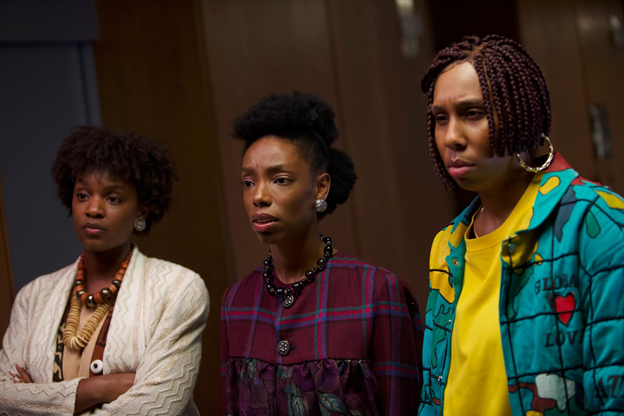
BAD HAIR
Dir. Justin Simien
DEAR WHITE PEOPLE’s Justin Simien returns for a killer weave creature feature and, man, do I wish that was a cause for celebration. BAD HAIR is certainly a Justin Simien picture, I mean, for fuck’s sake, man, the TV station rebrands from “Culture” to “Cult.” The entire narrative is firmly planted on-the-nose, but that’s a joke that gets real good when the workspace re-design ends up looking like the Complex offices. The director’s love for canted angles and heavily stylized framing finally feels more natural in the genre confines, but BAD HAIR is a genre film not scary enough to justify its self-seriousness and not nearly insane enough to halt any yawns at 1:09 AM of its midnight screening. An erotic slave lore Giallo should be a lot crazier than this, Hell, it’s insane how this doesn’t subvert the obligatory police detective narrative of Giallo, but it is a swing for the fences nevertheless. The question remains: is it Simien’s swing to take? What was most curious about DEAR WHITE PEOPLE is even more apparent here. Simien has almost as much beef with his own creed as he does the oppressor. His arguments against the Black community are vicious, turning the film into a clash of perpetrators rather than attacking the root cause, but he’s found here offering searing critique on matters he has no business wagging a finger at. Straightening natural hair is unnatural, painful, and horrifying, for some, sure, but what is BAD HAIR if not a figure of the patriarchy boo-booing a woman’s choice? Is modern Black hair care steeped in racist ideology? Sure, the case could be made, but it might just be that some women like themselves bad hair… so what? With Hulu slating the film for a theatrical release, Justin Simien’s about to get a real fucking earful in 2020. [Kevin Cookman]
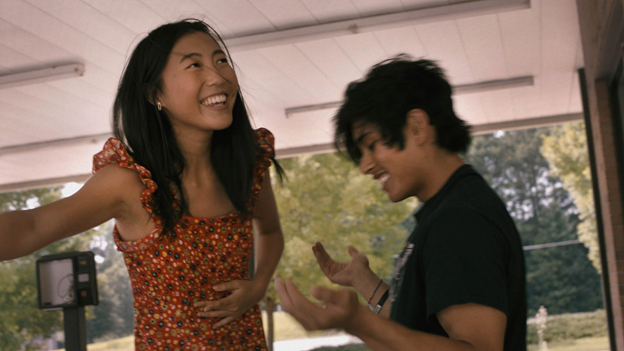
BEAST BEAST
Dir. Danny Madden
Sundance can be defined by its cliches and tropes. It’s very easy to guess the kinds of movies that do well at the festival. Films about cancer, grandmothers, and obviously underlined social issues, with a sprinkling of quirky coming-of-age films and the occasional genre oddball. BEAST BEAST unfortunately checks multiple of those boxes, which wouldn’t necessarily be a problem if the film had its ratios right, but BEAST BEAST suffers under the guilt of smothering a charming indie rom-com with the greasy hands of a school shooter narrative largely unconnected to the rest of the film. Shirley Chen shines as Krista and she should, given her relevant experience. Cast when she was in her high school theater program, Chen’s connection to the material is real and her naturalism deeply affecting. Jose Angeles as Nito has a similar charm, conveying more than words ever could with deft physical acting and a star-making smile. If the film was just these two’s love story it would be fine, but a deeply cursory understanding of the role social video plays in teens lives (BEAST BEAST has some IDEAS about YouTube) and a shooting that clouds the positive aspects of the film dilutes the film’s power. There’s a story that shows the unexpected trauma of a shooting in the context of the high school experience, but it focuses on that heavier subject matter first: gun violence. BEAST BEAST does a disservice to both storylines by letting both suffer in relation to each other. It’s quite alright to specialize rather than tick boxes, and as Danny Madden is a younger filmmaker in his own right, hopefully future work can keep that eagerness to explore more intimately the lives of young people while getting those “ratios” right. [Ian Campbell]
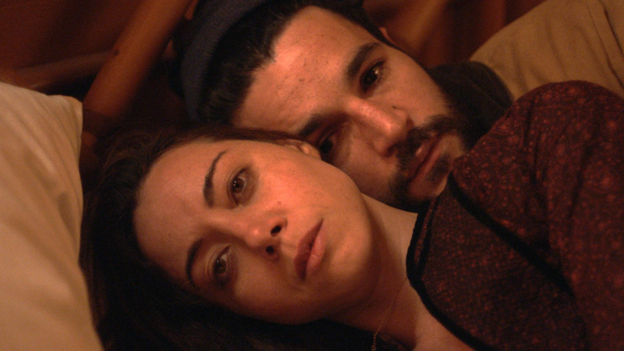
BLACK BEAR
Dir. Lawrence Michael Levine
Oh, BLACK BEAR, a film so far up its own ass that it should be destroyed on sight, and yet I can’t stop thinking about it. For the sake of your enjoyment, I won’t say much. Aubrey Plaza breaks her own mold, going full-hog Gena Motherfucking Rowlands against Christopher Abbott’s calm, but calculatedly manipulative cool in interspersed narratives of psychological warfare. The film opens as a thriller that turns into a forceful, on-the-nose marital dispute, wherein Plaza plays the dormant harbinger of love’s doom, but as the second act heats up, the film cuts to a parallel narrative, where Abbott looks like the Allen to Sarah Gadon’s Farrow. Is that a coincidence, or is it made to look like a coincidence? Where are we? BLACK BEAR provides no answers, pulling our wrists through its own hallways until we’re lost in the guts. It’s Aubrey Plaza hosting a muse-to-auteur dialectic episode of Tales From the Crypt about “The Cool Girl.” Sold yet? [Kevin Cookman]
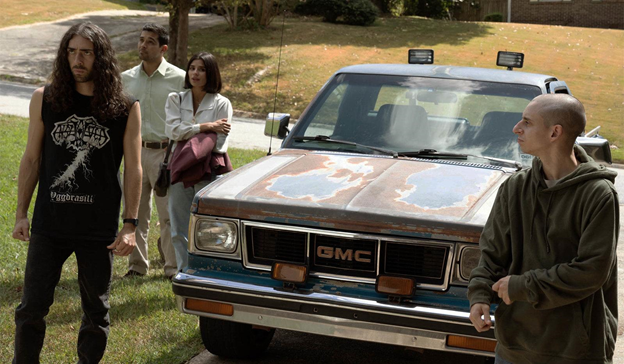
BLAST BEAT
Dir. Esteban Arango
Man, it’s never fun when one of these sucks. BLAST BEAT is a scraggly Colombian-American ode to the immigrant experience, a story of two brothers hungry to fit in but hungrier to achieve the best versions of themselves, all the while the film figures out the best version of itself in real time. Starring Moises and Mateo Arias, former Disney Channel character actors and members of the Jaden Smith child star alliance, as high school students immigrating to Georgia so the eldest can pursue his dreams of joining NASA, the film flirts with being a coming-of-age story while texting a stoner-comedy at the same time. Director Esteban Arango loves himself a twirling camera, utilizing every tacky plunge and twist in the young cinematographer’s handbook, at times going so overzealous with the handheld that I, Kevin Cookman, a vocal supporter of shaky-cam, started getting nauseous by the frame. It starts as a very 2000-era skater video approach to cinematography, but the framing of characters in domestic arguments starts resembling TV coverage more than a vivacious spirit. Characters act in such bizarre ways, particularly when the younger brother starts wrecking a jock’s car at his house party, so the jock proceeds to… Call the cops at his own party? If there’s anyone who hates the police more than Latinx kids, it’s a white kid with a keg. BLAST BEAT is not so much a cohesive story as it is a tasting menu of Colombian culture. While the brothers are somewhat charming (to be honest, they’re mostly just spaced-out), there’s little here conceptually that couldn’t be offered by a laminated pamphlet. The attempt would still be warm-hearted inspiration if its ending statement on which immigrants deserve a spot in the United States and which are better off in their domestic militaries wasn’t so highly suspect. [Kevin Cookman]
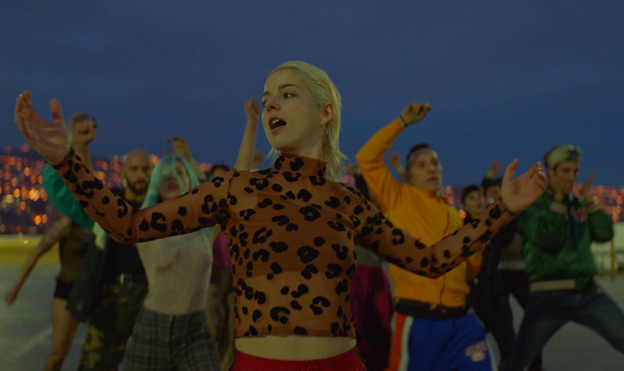
EMA
Dir. Pablo Larraín
Ema (Marianna Di Giralomo) has a flamethrower. Ema gave up her son. Ema decides to find out how much fire it’ll take to change that. Pablo Larrain’s EMA is initially odd. The film primarily exists as a sort of pulsing reggaeton haze of throbbing dance and sex scenes, lit by the fiery destruction of private property and social norms. And EMA features the kind of public flaying of interior perspectives that Larrain has featured in previous works like JACKIE, but the carcass on display has far more bite and a much more wild perspective. Because try as she might, Ema’s not a great mom, but she just might be fantastic at a more primal kind of mothering. The film glides along that tension, the wildness of Ema and her intuitive scheming across the pressure of various structures like work, society, and Ema’s choreographer boyfriend, Gastón (Gael Garcia Bernal). The characters behave oddly, are covered by a camera that at time fluctuates between knowing all the dance moves, to being the locked frame of a security camera and are nestled in Nicolas Jaar’s throbbing score. The film at almost all times feels messy, a messiness that’s only saved by tremendous dance scenes woven through the streets of Valparaíso. The prickly nature of the characters combined with the seemingly slight nature of the story easily justifies the more tepid response to EMA in comparison to Larrain’s other work. But the film is more about feeling, your body in sync with your mind, knowing the moves but adding your spins and touches. Ema burns differently each time. [Ian Campbell]
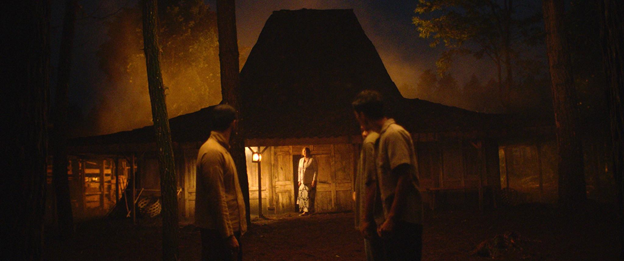
IMPETIGORE (PEREMPUAN TANAH JAHANAM)
Dir. Joko Anwar
There are moments of PEREMPUAN TANAH JAHANAM that I would describe as amateurish. I had the sense watching it that the movie wanted, above all, to be a horror movie; this means: to lure me in, to involve me in characters and endanger them, to make me yell “Fuck You” while laughing and disgusted, and no other promises. Yet this was never less than fascinating. The story tropes, and even whole familiar strips of film from horror classics, are remixed into Joko Anwar’s technically-excellent aesthetic. Horror and punk share in method sensation induced by discord. Through it, “Fuck You” joins “God” and “Love” and other angel-baby preciousness as pearls kept in art’s wet mouth (people for whom “Fuck You” seems too vulgar to share space with the others probably understand nothing about art’s force, history’s churn, or the present’s nightmare, and maybe even need their asses kicked, but that’s neither here nor there). Like metalheads playing with a classical musician’s finesse, PEREMPUAN TANAH JAHANAM exercises technique for its own sake, with humble tools. Scenes often feel cheaply accomplished and what they accomplish for the story, or (for the boring) a meaning, feels small. It’s the *way* that they are accomplished that delights. This is a great movie for people who like what a movie is *materially*— lighting, composition, editing, concerted into depth and motion hallucinated across a screen. Who gives a fuck about meaning? Guitars make noise, not notes. Watch this late at night, groan if you have to, eyes feasted on dumb perfect skill.
Note: Impetigo is a bacterial infection of the skin… get it? [Jehmbo]
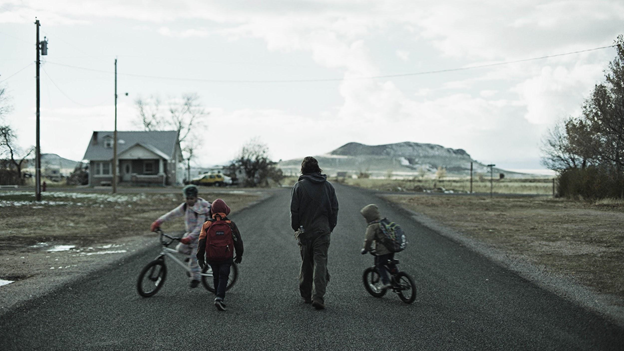
THE KILLING OF TWO LOVERS
Dir. Robert Machoian
Men are confined by rigidity. The structures of identity, a kind of self-imposed culture expectation of masculinity that’s lacking on all fronts save for anger and easily bruised ego. The locked-down compositions of THE KILLING OF TWO LOVERS reflect that. Characters are practically crushed under the too-big Utah sky, a broad expanse of capital-N nature that would feel indifferent if it wasn’t so beautiful. Carrying the weight of it is David (Clayne Crawford), navigating a separation from his wife Nikki (Sepideh Moafi) and the growing discomfort of his children. From the jarring starting place of his character, THE KILLING OF TWO LOVERS takes David and the audience through a set of tense scenarios that test David’s actual willingness to give his wife “space” rather than pretend that everything’s fine and they can just move on. It’s a tricky line to walk, but Machoian gets strong performances out of his leads, even if the dialogue and story can seem sparse. There’s a real feeling that the film gets paler the further it extends from its clear short film origins (a blow-up scene near the end worth everything that came before), but the visual beauty and distinct sound design largely make up for it. THE KILLING OF TWO LOVERS deserves praise for tackling toxic masculinity in the less common setting of a family drama. When much of the previous discourse has been focused on the mistakes of young men, seeing the pressure and performance of a source of the toxicity (fathers) is a welcome divergence. David tries hard to be a good man, but it’s the self-knowledge he gains from the events of the film that actually give him a strong identity to stand behind. [Ian Campbell]

MINARI
Dir. Lee Isaac Chung
Following a Korean family immigrating to the outskirts of farmland Arkansas with a knowledge of newly niche produce and a portable home feebly held up by a cinder block foundation, A24 and Lee Isaac Chung’s MINARI was the breakout sensation of Sundance 2020. Engaging with the film amidst its inescapable buzz was tough, with the end product feeling so slight and ending right as I’d expect its third act to start up. The film was fine. I smiled, I was choked up in critical moments, and, sure, I may have checked my watch once or twice. Yet, when I read back the critique I’ve just written, I noticed a corollary: these were my exact qualms with Barry Jenkins’ MOONLIGHT, a film I was lukewarm towards that felt much smaller in relation to its towering praise in 2016 that I later rightfully recognized as a masterstroke in humanist drama once I could place it in the scope of Jenkins’ works, removed from the publicity hubbub. Chung’s provenly deft hand at cultural ennui and the melancholic life lessons it imparts is incredible, and while I may end up enjoying his debut more as the 2020s progress, I once made the mistake of undervaluing the act of being seen, so I won’t with the comforts of MINARI. That being said, there’s a bit of an ensemble issue—Steven Yeun, watchable as ever, is constantly mounted as the narrative’s driving force when, really, all pacing screeches to a halt whenever Yuh Jung Youn, playing the rambunctious grandmother, isn’t on-screen. For a film dedicated to grandmas, there’s a curious amount of screen-time dedicated to staid agriculture, in what amounts to a stock “the harvest is good, oh no, wait, the harvest is bad” farming storyline. Yeun breaking his back over his crops is the most transparent of the film’s attempts at being a fable of expectations: those that are dashed in an instant and those that become distant goals for ourselves when ascribed by others. The film’s joys are less in its long-game and more in the moment-to-moment. MINARI’s most lovely touch is when the matriarch of the Yi family, played with the stirring angst of displacement by Han Ye-ri, nearly weeps when gifted chili powder and tins of anchovies from Seoul. When we think of what qualifies as “home,” often it’s the taste. [Kevin Cookman]
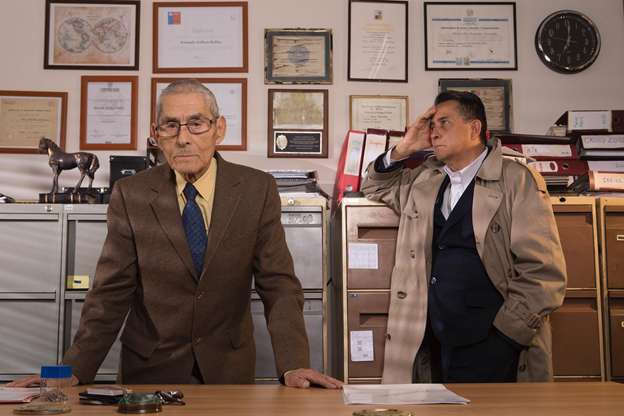
THE MOLE AGENT
Dir. Maite Alberdi
The most moving mysteries are the ones that neglect the surprising in favor of what’s true. THE MOLE AGENT features one such mystery, but what’s perhaps most compelling is that the film’s subject, Sergio, a Chilean octogenarian widower tasked with going undercover in a nursing home in Santiago, learns just as much as the film’s audience does. It’s this blending of audience surrogate and film narrator that gives THE MOLE AGENT its heart. Director Maite Alberdi’s best success beyond giving Sergio the opportunity to film himself (with a series of humorous spy gadgets like a camera pen and hidden camera glasses) is the casting of Sergio in the first place. THE MOLE AGENT hinges entirely on Sergio’s compassion, his disarming kindness and damned “gentleman-ly qualities.” He gains immediate access to the nursing home’s majority female population because they find him handsome, but he becomes their friend and confidante because he’s moved by their stories and caring in his responses. Sergio’s assisted by a real private detective, whose initial reason for sending his new elderly mole undercover is to investigate a case of supposed elder abuse; Sergio’s ability to use an iPhone is a desired quality. But the story ends up being far larger than that, occupying a space much more existentially troubling than physically dangerous. With heart and humor, THE MOLE AGENT digs up plenty of dirt on the real danger of getting older in the last decade while tying an intriguing knot with the twin strands of performance and irony. Sometimes old dogs learn new tricks and sometimes the ability to learn at all ends up being the most important. [Ian Campbell]

THE MOUNTAINS ARE A DREAM THAT CALL TO ME
Dir. Cedric Cheung-Lau
Director Cedric Cheung-Lau films the Annapurna Massif like celestial bodies, with tectonic shot-lengths, to be traversed by these minuscule human satellites: Tukten, a young Nepali man on his way to a kitchen job in Dubai, and Hannah, an older Australian woman, heading in the opposite direction to obscurer purposes. If making films is like making a home inside time’s weathering flux than the criticism slower ones often receive is that they are drafty to the point of missing an entire wall, or incapable of standing up. Good slow films require less construction materials, letting physics do the hard work. Here, the sound of a singing bowl, the globally-writ differences of a few characters, and a beguiling supernatural figure lean-to very well. While streaming seeks to box cinematic time into the lonely, enfeebled minutes of a hunger, film festivals restore a momentousness to move-going, and the difference between these methods of distribution is the difference between victory over lunch and victory over something like fortune; the joy of getting what you want when you want it can’t rise to the joy of getting everything from nothing; THE MOUNTAINS ARE A DREAM THAT CALL TO ME offers the latter’s kind of success. As a construction its house may lack amenities of plot, and ask you to bring your own jacket to better weather cold, but its view over time’s productions are worth the exertion. [Jehmbo]
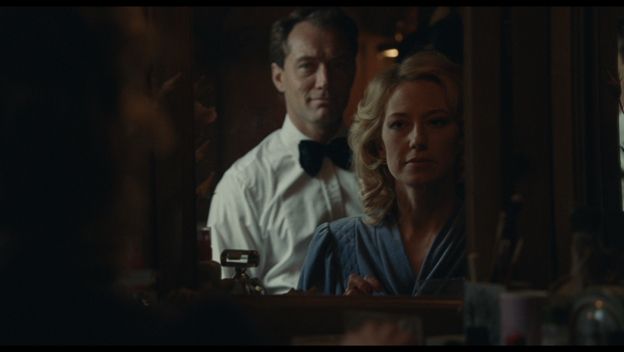
THE NEST
Dir. Sean Durkin
It’s always a good sign when a filmmaker recognizes that the base standard nuclear family is a shattered group of people from the get-go, not an end result. So goes THE NEST, the long-awaited feature follow-up from MARTHA MARCY MAY MARLENE’s Sean Durkin, a tale of a marriage in stark, deathly decline. A spiritual prequel to THE SWIMMER, Jude Law’s commanding turn as a spouse who espouses pure bullshit to fake the stability of richness in the face of wealthy peers is matched by a screenplay that understands every one of his insecure inklings. His lies rattle the vintage boards of his newly minted manor like the displeased spirits of THE HAUNTING. Every bulb is half-dead, each room and its secret compartments more frigid than the last. THE NEST plays its characters’ lies as ghosts creeping under the floorboards. The only exorcisms are the furious arguments between husband and wife, wherein Law and his cohort, Carrie Coon, spew vitriol at one another at a machine-gun pace. While one of my biggest qualms with Baumbach’s MARRIAGE STORY is its untapped critique of its characters’ pathetic performative quarreling, THE NEST broaches the obnoxious, circuitous nature of a spousal fight founded in posturing head-on. Coon is terrific as a stogie-chomping horse whisperer intent on breaking in her stallion of a crook husband, even if it means capping his knees and indifferently firing a bullet into his ego’s cranium. THE NEST spends a long while before giving her any agency of interest, mostly relegating the character to reactions, but the moments her gloves come off and the proverbial knives come out are bracing. Most of Coon’s time is spent on trotting cycles, training ailing beasts in what appear to be wide-open, yet fenced-in spaces. Law’s Rory suffers from the grossest delusion of grandeur: getting swindled into buying one of those mansions where Led Zeppelin recorded albums without realizing that those mansions were absolute fucking real estate nightmares that could only ever viably be rented out. New age music blasts as the walls of old values get trashed in a high school party: the times are moving forward at unprecedented speeds. Come for Jude Law’s thick ol’ donk in those dad jeans, stay for the icy, 107-minute-long simulated dosage of drip-flow lethal injection. [Kevin Cookman]

PALM SPRINGS
Dir. Max Barbakow
As it usually goes, the biggest sale of Sundance was over one of the dullest. PALM SPRINGS, billed as a Lonely Island Classic, initially feels like a HOT ROD take on HAROLD & MAUDE, with the absurdity cranked to 11 on the unlikely love, but especially the suicide attempts. PALM SPRINGS follows a rocky road map of Lonely Island-type chaos to earnest romantic comedy then back to chaos—neither the jokes or love story get to reach their fullest potential in its quest to please as many audiences at the same time as possible. If the film was 78 minutes, I think the flow would pay off, especially considering how forgone the conclusion is for these time-loop narratives—director Max Barbakow is so set on the endgame from act one that he almost forgets that the joy of this story trope, a Betty Crocker’s cake mix for a surefire fun time, is watching what characters do with eternity. It’s the first time I’d ever qualify The Lonely Island’s humor as “lol random,” as their brand becomes more of a flourish in a story of high-concept self-discovery that does very little to identify itself. Casting Andy Samberg as a pretentious sad-boy (read: I did not know that was what he was going for until a character explicitly called him a “pretentious sad-boy.”) is a confusing choice when Andy Samberg can still do a pretty excellent Andy Samberg, but I suppose it gives the vibrant Cristin Milioti more space to make everyone think “wait, why haven’t we been putting her in more things?” It’s cute and pleasant, but really just attractive TV actors playing dress-up with GROUNDHOG DAY costumes from the fledgling K-Mart’s clearance section to cash in on RUSSIAN DOLL before too many other studios catch wind of the time-loop’s comeback. [Kevin Cookman]

POSSESSOR
Dir. Brandon Cronenberg
Holy fucking Hell almighty, POSSESSOR. Y’know, just your run-of-the-mill FREAKY FRIDAY spy caper apocalyptic splatter feature. While many will lazily jump to fatherly comparisons (it’s true, the father and son share an admiration for the frosty opulence of DEAD RINGERS), Brandon Cronenberg’s POSSESSOR feels like a Verhoeven homage. It’s like Cronenberg took that escalator shootout from TOTAL RECALL and decided to craft an entire lore from the ethics of that one scene—it’s dour and evil in its view of the sanctity of human life, but also humorously so, in that Cronenberg is the same type of director to pull the trick of eviscerating a rat with an SMG to crossfade the raspberry jelly innards into the crimson skies of Mars. Anatomical viscera as worldly ephemera and violence as memory; the world of POSSESSOR sees humans as meat draped in coiled leather and candle wax. Christopher Abbott is on some absolute X-Games shit as the possessed body, a human drone sent in to carry out his presupposed narrative of emasculated rage while contending with the wiry killer controlling all the switches and levers in his own head. Andrea Riseborough, still hot on a murderous string of performances, is appropriately dead inside as a character who plays with her victims’ blood seeping from their 22 stab wounds, but the way Cronenberg frames her struggle with Abbott to claim his body is a fascinating assault of strobe lights and potential trans philosophies. I am beyond excited to read what POSSESSOR conjures up in regards to its gender dynamics. The film posits that the toll of full submission into others is an act of submission itself—increased digital surveillance forfeits agency of the body and mind, forcing us all to engage against our will, or willingly, in a system of senseless death. There will be many who grimace as they engage, but there will be a great deal many more than we’d care to accept, that will seize the position in guileless stride. POSSESSOR is a rumination in the joy of violence, one meant to thrill and indict the midnight viewers who come for the absolute evisceration of bodies. I cannot get enough of this goddamn movie. [Kevin Cookman]

RELIC
Dir. Natalie Erika James
Yup, that is definitely a textbook “old lady horror movie.” The comparisons to THE BABADOOK and Kojima’s mortifying P.T. oversell the feats of RELIC, the debut of Australian director Natalie Erika James about a mother and daughter who travel to the countryside to visit a grandmother with severely onset dementia. When they arrive to the home, creepy and creaky from the get-go, even the ceramic fruit bowl is molding. The mirroring of the locale’s condition to the grandmother’s mental state is quite blunt. How blunt? Like a CT scan image, the house has large, spreading dark spots. Graceful, if I’d say so myself. While there are a good few scares that slam (a reveal of a character actually walking backwards when they seemed to be walking forwards is a simple, yet discombobulating gag), many are followed by such blasé reactions that RELIC begins to baffle. “Huh, there was obviously a weighted, shadowy presence in this locked bathroom, but now that it’s suddenly unlocked after I pounded on the door, I suppose instead of inspecting further I will continue with my chores!” Emily Mortimer sees breathing shadows and hears thunderous thumps behind the walls, yet she and her daughter, a game Bella Heathcote, treat this all like a couple of raccoons in the trash bins. When a wary neighbor relays a story about how the grandmother locked his child in a closet for six hours while the whole town searched, the granddaughter responds with a disproportionately curt “No, yeah, I get it.” It’s been roughly 40 years since Richard Pryor’s joked about families of color in horror movies immediately vacating their home after a single bump in the night, so watching these Aussie psychos treat a full-on possession like a case of the common cold quickly goes from slightly unnerving to gut-bustingly funny, and not in a way that helps RELIC land its grief parable. It’s THE TAKING OF DEBORAH LOGAN-level gross and exploitative until its final seconds, where somehow James crafts a scene so tender and meaningful that she undoes a feature’s length of stigmas with one of modern horror’s most compassionate endings. James has a terrific control of light and dark, but I wish what waited in RELIC’s shadows was worth the build-up. [Kevin Cookman]

TIME
Dir. Garrett Bradley
How do you spend your time waiting for the inevitable? Even if that inevitable thing could be positive? There’s so much time, an indefinite amount, that has to pass between you and the thing you want. You could put everything on pause, take it on the chin, or you could “live” with all the complications that entails and maybe close that gap a little bit sooner. TIME, directed by Garrett Bradley, is a record of that waiting and that living. Using the home videos of Sybil Fox Rich’s as a starting place, Bradley constructed the narrative of a woman’s resilience being put to the test as she waits over two decades for her husband to be released from prison. What starts as a way for Fox’s husband Rob to see his sons grow up in Bradley’s hands becomes an elegy for waiting. Happy waiting, sad waiting, and angry waiting. The kind of waiting that a person only really confronts when dealing with the indifferent bureaucracy of the criminal justice system. Captured in beautiful black and white that only serves to highlight the Rich’s situation, TIME commands more feeling than most documentaries can by placing the audience firmly in the perspective of Fox Rich. She is assured, calm, cool, and collected, whip-smart and fed up with being yanked around for something her and her husband did in desperation. TIME succeeds by making Rich’s perspective clear and by showing in the briefest of moments the vulnerable side that hides under her tough and practiced exterior. She’s caught up in the waiting and the audience with her, but that makes the relief on the horizon, that soft dawn of hope, all the more powerful when it finally arrives. [Ian Campbell]















Comments